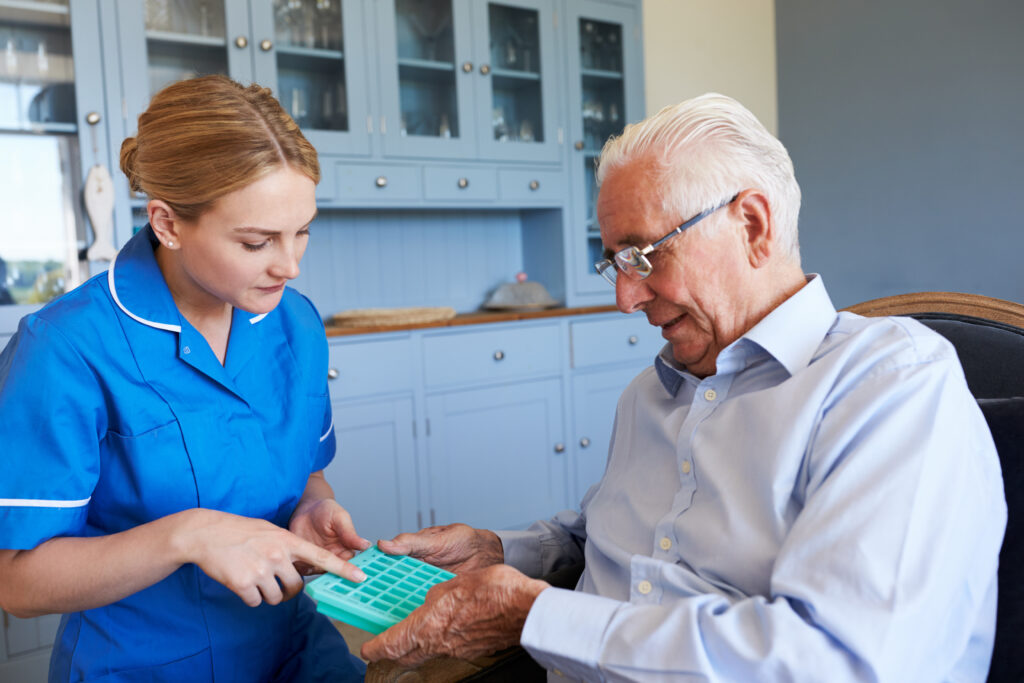While it was those classic “This is your brain on drugs” commercials that got so much attention in the ‘80s, it’s America’s “other drug problem” that caregivers need to worry about today.
Unlike the original war on drugs, this is a crusade to encourage people to use drugs—more specifically, to use drugs in the right way. Known as medication adherence, it means taking the right drug at the right time, and in the right dose. Unfortunately, Americans often struggle with medication adherence, and the consequences can be deadly: U.S. Pharmacist reports that medication nonadherence – not taking a medication as the doctor prescribes – leads to approximately half of all treatment failures and around 25% of hospitalizations annually.
This presents a unique responsibility for caregivers, wrote Geoff Gross in Social Work Helper:
“Caregivers have a unique opportunity to improve senior health outcomes. Caregivers can act as an extension of the medical industry to help seniors overcome the hurdles they face when it comes to medicating themselves properly.”
Most already serve that role. In fact, many caregivers know more about their loved one’s medications than the patient themselves. And that knowledge can make all the difference when it comes to the health and happiness of the senior in your life.

Reasons for non-adherence
Non-adherence includes not only failing to fill a new prescription but also not taking it as prescribed or failing to refill it as directed. Of course, the underlying reasons for non-adherence paint a more complex problem, but some of the common reasons reported by patients include:
- Forgetfulness
- Cost of the medication (which causes some patients to split doses to save money or skip refills)
- The complexity of a certain medication regimen
- Side effects of the drug
- Doubting the need for the medication or a lack of confidence in its effectiveness
- Treatment fatigue
Other reasons for non-adherence may come into play as well, such as cognitive impairment or depression, or simply poor communication and follow-up from the doctors and health care team.
Yet, as a caregiver, you’re in a position to encourage proper medication adherence and to help your loved one understand the reasons for following a treatment regimen as prescribed—most notably the likelihood of a more effective treatment.
Dangers of medication non-adherence
On the flip side, the dangers of non-adherence – and an ineffective treatment – can be devastating—a recurrence or progression of cancer, for example, or a dangerous spike in your senior’s hypertension. Side effects also become a concern with non-adherence: Drug interactions, doses taken too close together, or even “overadherence” – taking more than prescribed (often under the belief that more is more effective) – all can lead to an increased number (and severity) of side effects your loved one may encounter.
Your senior’s physician may also make unnecessary changes to the treatment plan as a result of medication non-adherence. The health care team may believe the treatment isn’t working, which could lead to additional diagnostic tests, new medications (and possibly new side effects) and other changes that may adversely affect the senior’s health.

Tips and tools for better drug adherence
So, how can you help an older adult better adhere to the prescribed medication plan? Start by spending a little more time at the pharmacy. Pharmacists are a wealth of knowledge about each medication and can often provide solutions to any barriers you’re encountering with the senior in your life.
Is the label printing too small to read? Ask for a new prescription label in large print. Are the pills too hard to swallow? Ask about alternative delivery methods of the drug, such as liquid, skin patch or suppository forms. Does your senior have arthritis or a disability that prevents them from easily opening a pill bottle? Ask for a larger, easy-open container.
Technological advances also offer a number of new solutions for better medication adherence, as Lea Bourgade and Erin Knitis wrote in HomeCare Magazine:
“The market for medication management technology solutions has never been greater … Technology is rapidly developing through the use of data analytics, machine learning and artificial intelligence, and the potential applications of those advancements for improving medication adherence and tracking are nothing short of exciting.”
Explore some of the available tech options to see what fits your situation the best:
Voice-based virtual assistants – Tools like Amazon Echo and Orbita Health are using artificial intelligence to simplify medication adherence and coordinating care for elderly patients.
Automated medication dispensers – Many of these latest models now sync with your smartphone to send reminders and push notifications. New innovations are also in the works, like one new product called PillPez that uses pre-loaded medication strips and an increasing system of reminders to both patient and caregiver. The Seattle-area company just landed $1 million to help launch the new product.
Text messaging – With the ubiquity of smartphones across all generations, one study found that text message reminders doubled the odds of medication adherence and improved the rate of adherence by nearly 20%.
Your role as a caregiver
Only you know the system and methods that will work best for you and your senior, but medication adherence is crucial to their health and well-being—and the responsibility often falls to the caregiver. Learn what you can do to help encourage adherence and to ensure your loved one isn’t a victim of America’s latest drug problem.

